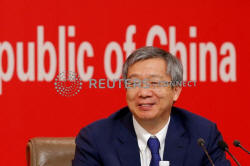China to balance stable growth and risk prevention: central bank
 Send a link to a friend
Send a link to a friend
 [October 21, 2020] BEIJING
(Reuters) - China will strike a balance between stabilising economic
growth and preventing risks, even as debt was allowed to temporarily
rise this year to support the coronavirus-hit economy, the head of the
central bank Yi Gang said on Wednesday. [October 21, 2020] BEIJING
(Reuters) - China will strike a balance between stabilising economic
growth and preventing risks, even as debt was allowed to temporarily
rise this year to support the coronavirus-hit economy, the head of the
central bank Yi Gang said on Wednesday.
Yi, the governor of the People's Bank of China (PBOC), told a financial
forum in Beijing that he expected China's macro leverage ratio to
stabilise next year as the economy expands, after the debt gauge rose in
2020.
Bank lending in the first nine months totalled 16.26 trillion yuan
($2.44 trillion) as policymakers looked to reboot economic activity,
beating a previous peak of 13.63 trillion yuan in the same period last
year.
"Monetary policy needs to guard the 'gates' of money supply, and
properly smooth out fluctuations in the macro leverage ratio, and keep
it on a reasonable track in the long run," Yi said.

In July, Ruan Jianhong, head of the PBOC's statistics department, said
that the country's macro leverage ratio jumped 14.5 percentage points in
the first quarter and climbed further in the second quarter.
The macro leverage ratio is a measurement of the debt held by Chinese
governments, households and companies divided by total gross domestic
product (GDP).
The central bank has not given further details on the figure.
The Institute for International Finance (IIF) said in July that China's
debt-to-GDP ratio was on track to hit 335%, from nearly 318% in the
first quarter.
At the same forum, PBOC Vice Governor Pan Gongsheng said that the
central bank had prepared a draft to improve macro prudential
assessments, which measure weaknesses in financial systems, for the
property finance sector.
[to top of second column] |

Governor of People's Bank of China (PBOC) Yi Gang attends a news
conference on China's economic development ahead of the 70th
anniversary of its founding, in Beijing, China September 24, 2019.
REUTERS/Florence Lo

PBOC will look into indicators including the concentration ratio of property
loans, the ratio of household debt to total income, and the risk-weighting of
property loans, said Pan.
A list of China's systemically important banks, and detailed regulations for
them, will be revealed in the near term, he added.
Also at the forum, Vice Premier Liu He said the economy will very likely grow
this year, adding that prudent monetary policy should be kept appropriate and
flexible, and liquidity reasonably ample.
On Monday, China reported its GDP grew 0.7% in January to September from a year
earlier, versus a contraction of 1.6% in the first half following the
coronavirus outbreak.
Speaking on a separate panel at Wednesday's forum, Yi warned that financial
technology, while making services more convenient, has created data gaps and
faces problems when it comes to protecting business secrets and personal
privacy.

Public and government information "must be more transparent... (but) what must
be protected must be protected," he said.
(Reporting by Binbin Huang, Cheng Leng and Ryan Woo; additional writing by Tom
Daly; Editing by Kim Coghill and Christian Schmollinger)
[© 2020 Thomson Reuters. All rights
reserved.] Copyright 2020 Reuters. All rights reserved. This material may not be published,
broadcast, rewritten or redistributed.
Thompson Reuters is solely responsible for this content. |